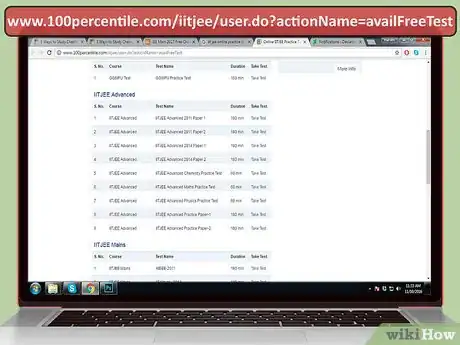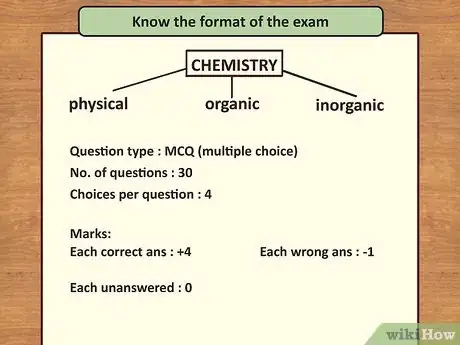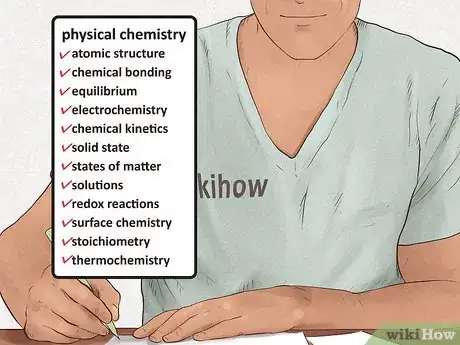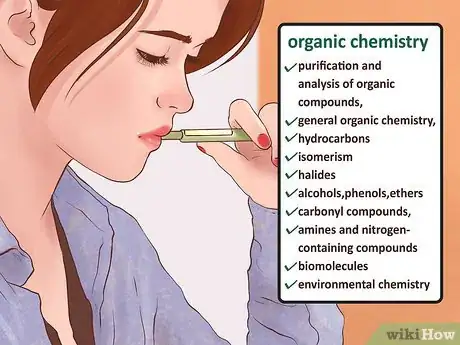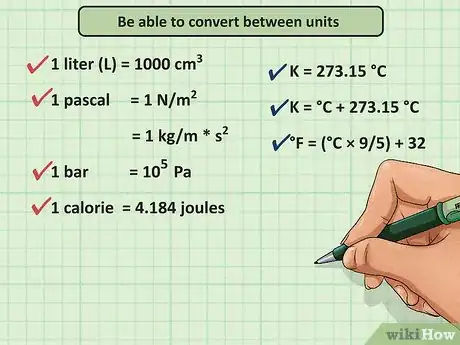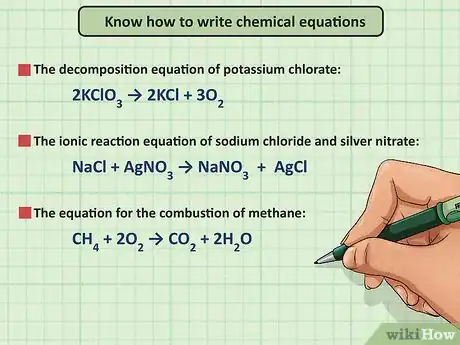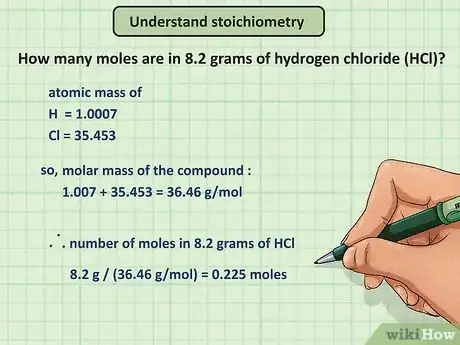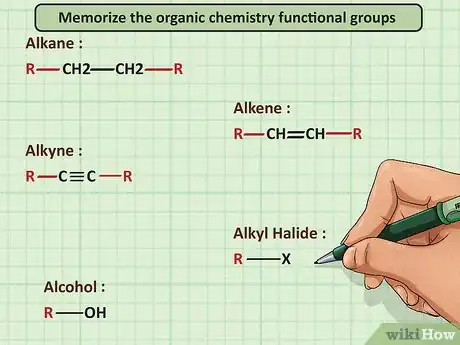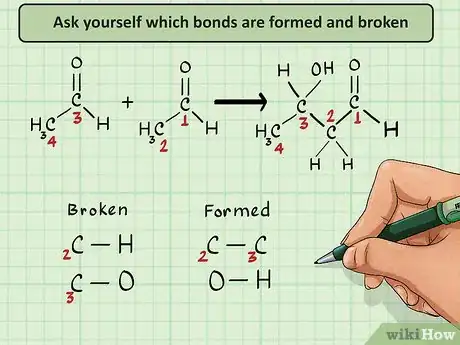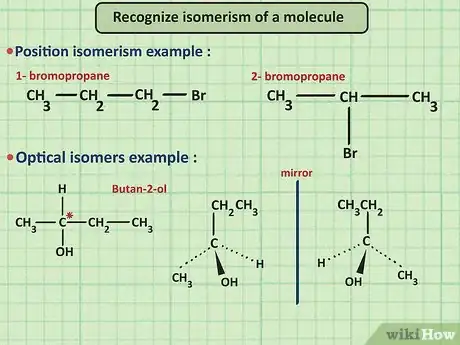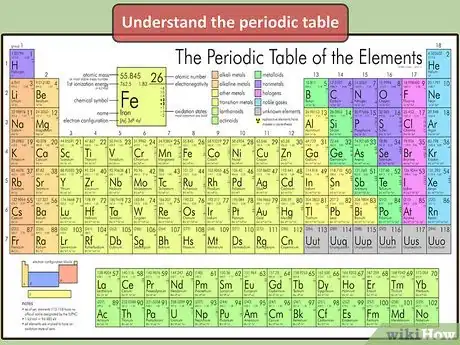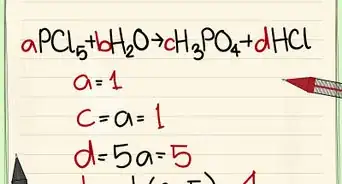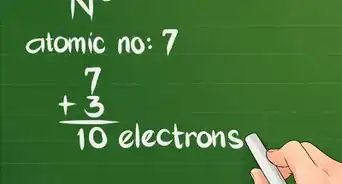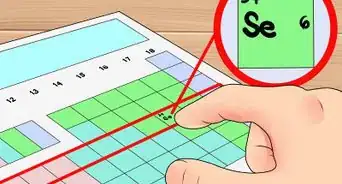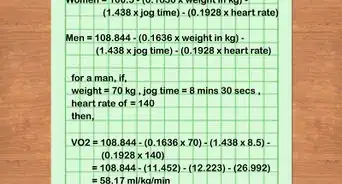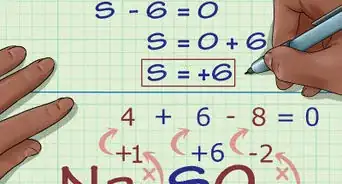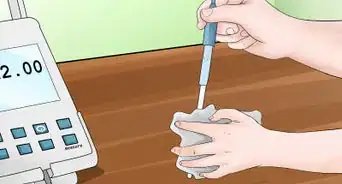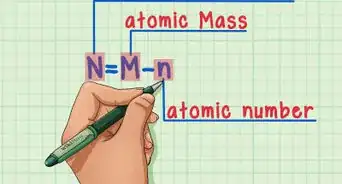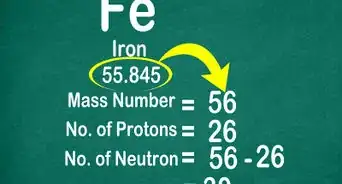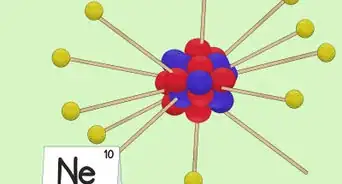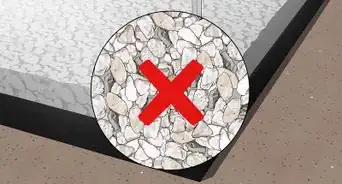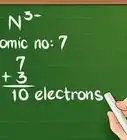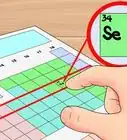This article was co-authored by Jake Adams. Jake Adams is an academic tutor and the owner of Simplifi EDU, a Santa Monica, California based online tutoring business offering learning resources and online tutors for academic subjects K-College, SAT & ACT prep, and college admissions applications. With over 14 years of professional tutoring experience, Jake is dedicated to providing his clients the very best online tutoring experience and access to a network of excellent undergraduate and graduate-level tutors from top colleges all over the nation. Jake holds a BS in International Business and Marketing from Pepperdine University.
There are 14 references cited in this article, which can be found at the bottom of the page.
wikiHow marks an article as reader-approved once it receives enough positive feedback. In this case, 90% of readers who voted found the article helpful, earning it our reader-approved status.
This article has been viewed 67,769 times.
Chemistry is one of three sections on the Joint Entrance Exam (JEE). It is generally considered to be the most difficult subject because of the organic chemistry questions. The best way to study for any standardized exam is to give yourself plenty of time and do lots of practice problems/exams. The chemistry section of the JEE is no different. By studying every day and focusing on the concepts you are most likely to see, you can do well on this section.
Steps
Studying Basics for the JEE
-
1Purchase study guide books specific for IIT JEE. A study aid specific to the exam is one of the best ways you can study. It will have content covering all of the topics you are likely to see on the exam and questions in the proper format. These books also have practice exams that you should take to check your progress. In addition to study guides, the following chemistry books are good resources for studying:[1]
- Physical Chemistry, O.P. Tondon
- Numerical Chemistry, P Bahadur
- Organic Chemistry, Morrision and Boyd
- Because these books can be expensive, try to buy them second-hand or ask a friend if you can borrow theirs.
-
2Download study applications for your phone. There are many phone applications for both the iPhone and android phones that are specific to the chemistry portion of the IIT JEE exam. In addition, you can download basic chemistry learning apps for general chemistry knowledge. Flashcards of some concepts like functional groups would be particularly helpful. The following are some highly ranked apps:
- JEE Prep Plancess
- Toppr- JEE[2]
Advertisement -
3Enroll in a coaching course. Another great way to study for the IIT JEE is to take a class that specifically teaches the material on the test. This will help you not only with the chemistry portion, but also the mathematics and physics sections. Classes are nice because you can actually ask questions about the material and discuss it with an expert.[3]
- Classes will also teach you special strategies for approaching different questions and sections.
- These can also be expensive, but beneficial if you want to do well on the test.
-
4Study every day. Make a study schedule to maximize your time spent studying.[4] To do well on any exam, you need to make sure that you study the material every single day. Go through all of the topics that you need to know and assign them to specific days. Check your progress with practice questions and exams.
- Use a time-management system that works for you (pen and paper, online calendar, phone app, etc.).[5]
-
5Take practice exams. The absolute best way to prepare for the IIT JEE is to take practice exams. Exams from previous years are your greatest resource. These are questions that actually appeared on the exam and are indicative of what you are likely to see on your own exam. Make sure you adhere to the time limits of the test.[6]
- You have three hours for the whole exam so budget just one hour for the chemistry portion.
- If you can do well on a previous exam, you are more likely to do well on your actual exam.
- Aim to take 10-15 practice exams before your own test day.
Knowing What to Expect
-
1Know the format of the exam.[7] The chemistry portion of the IIT JEE covers physical, organic, and inorganic chemistry. It is multiple choice (30 questions) where each question will have four possible answers and only one will be correct. For every correct answer you get +4 marks, but for every incorrect answer, you get -1 mark. Unanswered questions are marked as zero (no points added or deducted). The exam can be taken either on paper or on a computer.
- Because there is a penalty for guessing, make sure you are confident with your answer before marking it.
-
2Learn the physical chemistry topics that will be covered. Topics within physical chemistry that you will be tested on include: atomic structure, chemical bonding, equilibrium, electrochemistry, chemical kinetics, solid state, states of matter, solutions, redox reactions, surface chemistry, stoichiometry, and thermochemistry.[8]
- The physical chemistry portion of the exam accounts for about 30-40% of the whole exam and is considered the most important section.
-
3Be familiar with all of the organic chemistry topics that will be tested. The essential topics covered for organic chemistry are: purification and analysis of organic compounds, general organic chemistry, hydrocarbons, isomerism, alkyl halides and aryl halides, alcohols, phenols, and ethers, carbonyl compounds, amines and nitrogen-containing compounds, biomolecules, and environmental chemistry.[9]
- Like the physical chemistry portion, the organic chemistry section is about 30-40% of the exam.
- The majority of the questions will be related to general organic chemistry (9%) and alcohol, phenols, and ethers (7%).
-
4Know the relevant topics for inorganic chemistry. For inorganic chemistry, you need to know about the properties of S, P, D, and F block elements, coordination compounds, polymers, general principles and processes of isolation of elements, and hydrogen.[10]
- This portion of the exam is about 25-30% of the questions. It is generally considered to be the easiest section.
Studying the Concepts
-
1Be able to convert between units. A very important basic concept in chemistry is knowing which units to use and how to convert between different units. Know the standard units for temperature (Kelvin), mass (kilogram), length (meter), amount of substance (mole), time (second), and electric current (ampere).[11]
- If you are given a temperature in degrees Celsius, you need to be able to convert to Kelvin: °C + 273 = K.
- Converting between metric units is also a necessary skill.
-
2Know how to write chemical equations. Being able to write a proper chemical equation requires you not only to know the naming conventions, but also how to determine products given reactants. Writing chemical formulas is an essential skill for the JEE.[12]
- Practice with many different types of examples to really master the concept.
-
3Understand stoichiometry. Stoichiometry is a concept that deals with determining the number of products and reactants in an equation. The mole is an essential component to stoichiometry and reaction. Balancing equations, limiting reagents, and percent yield are the three main aspects of stoichiometry.[13]
- Balancing an equation makes sure that the laws of conservation are conserved.
- In any reaction, there will be one reagent that is used up faster than the others. This is the limiting reagent and is important for chemical calculations.
- No reaction is 100% efficient. The percent yield is the amount of product actually made compared to the theoretical yield.
-
4Memorize the organic chemistry functional groups. While there are aspects of chemistry where memorization won't help, knowing the functional groups is not one of them. Being able to recognize a functional group instantly is crucial to your success on this exam.[14]
- Make flashcards or practice writing them out every day.
-
5Ask yourself which bonds are formed and broken. Memorizing organic chemistry reactions will not help you master this chemistry exam. A better way to approach these questions is to ask yourself which specific bonds are broken, and which specific bonds are formed.[15]
- Knowing what happens makes it easier to determine how or why the reaction progressed.
-
6Recognize isomerism of a molecule. Isomerism means that each molecule is composed of the same elements, but they are arranged differently within the molecule. There are two types of isomerism: structural and stereo.[16]
- Structural isomerism is when the molecular formula is identical but the structural formulas are different between molecules.
- Stereoisomerism is when the molecules have identical structural formulas but different spatial arrangements.
-
7Understand the periodic table. Know the sections of the periodic table that corresponds to S, P, D, and F elements. Have a working knowledge of the various trends in the physical properties and chemical properties of elements, along the periods and down the groups: transition metals, lanthanides, alkali metals, nonmetals, noble gases, etc.[17] [18]
- Focus your efforts on the co-ordination compounds and d-block elements.
Expert Q&A
-
QuestionWhat should I keep in mind right before taking the JEE?
 Jake AdamsJake Adams is an academic tutor and the owner of Simplifi EDU, a Santa Monica, California based online tutoring business offering learning resources and online tutors for academic subjects K-College, SAT & ACT prep, and college admissions applications. With over 14 years of professional tutoring experience, Jake is dedicated to providing his clients the very best online tutoring experience and access to a network of excellent undergraduate and graduate-level tutors from top colleges all over the nation. Jake holds a BS in International Business and Marketing from Pepperdine University.
Jake AdamsJake Adams is an academic tutor and the owner of Simplifi EDU, a Santa Monica, California based online tutoring business offering learning resources and online tutors for academic subjects K-College, SAT & ACT prep, and college admissions applications. With over 14 years of professional tutoring experience, Jake is dedicated to providing his clients the very best online tutoring experience and access to a network of excellent undergraduate and graduate-level tutors from top colleges all over the nation. Jake holds a BS in International Business and Marketing from Pepperdine University.
Academic Tutor & Test Prep Specialist Definitely understand how much time you want to spend per question. Have a plan for when you're going to say, "I've had enough of this question and I need to move on." Keep that in mind so that you use your time efficiently and avoid spending it all in one place.
Definitely understand how much time you want to spend per question. Have a plan for when you're going to say, "I've had enough of this question and I need to move on." Keep that in mind so that you use your time efficiently and avoid spending it all in one place. -
QuestionHow do I study from zero?
 Community Answer1. First of all you have know about matter and state of matter (it helps you). For example: what is matter, what are the states of matter or in which forms the matter exists. 2. After studying matter you will know that all matter is made with elements. 3 Start to learn about elements. 4. Try to memorize the elements' names. 5. Then try to learn about atoms, molecules, electrons, protons and neutrons. 6. After that study electronic configuration, then keep slowly working your way through the material.
Community Answer1. First of all you have know about matter and state of matter (it helps you). For example: what is matter, what are the states of matter or in which forms the matter exists. 2. After studying matter you will know that all matter is made with elements. 3 Start to learn about elements. 4. Try to memorize the elements' names. 5. Then try to learn about atoms, molecules, electrons, protons and neutrons. 6. After that study electronic configuration, then keep slowly working your way through the material. -
QuestionCan a JEE Main student crack IIT JEE?
 Saurabh GuptaCommunity AnswerYes. JEE Main is the first step toward appearing in the IIT JEE exam. Until you clear JEE Main, you cannot appear in JEE Advanced.
Saurabh GuptaCommunity AnswerYes. JEE Main is the first step toward appearing in the IIT JEE exam. Until you clear JEE Main, you cannot appear in JEE Advanced.
References
- ↑ https://owlcation.com/academia/IITJEE-2013-Follow-these-10-tips-to-get-selected-with-a-good-rank
- ↑ https://www.toppr.com/exams/iit-jee/
- ↑ https://owlcation.com/academia/IITJEE-2013-Follow-these-10-tips-to-get-selected-with-a-good-rank
- ↑ Jake Adams. Academic Tutor & Test Prep Specialist. Expert Interview. 20 May 2020.
- ↑ Jake Adams. Academic Tutor & Test Prep Specialist. Expert Interview. 20 May 2020.
- ↑ https://owlcation.com/academia/IITJEE-2013-Follow-these-10-tips-to-get-selected-with-a-good-rank
- ↑ Jake Adams. Academic Tutor & Test Prep Specialist. Expert Interview. 20 May 2020.
- ↑ http://www.askiitians.com/iit-jee-chemistry/physical-chemistry/
- ↑ http://www.askiitians.com/iit-jee-chemistry/organic-chemistry/
- ↑ http://www.askiitians.com/iit-jee-chemistry/inorganic-chemistry/
- ↑ http://www.askiitians.com/iit-jee-chemistry/physical-chemistry/some-basic-concept-of-chemistry/introduction.aspx
- ↑ http://www.askiitians.com/iit-jee-chemistry/organic-chemistry/iupac-and-goc/nomenclature-of-organic-compounds.aspx
- ↑ http://www.askiitians.com/iit-jee-chemistry/physical-chemistry/stoichiometry-and-redox-reactions/
- ↑ https://chemed.chem.purdue.edu/genchem/topicreview/bp/2organic/2org_frame.html
- ↑ http://www.masterorganicchemistry.com/2011/08/29/the-most-important-question-to-ask-when-learning-a-new-reaction/
- ↑ http://www.askiitians.com/iit-jee-isomerism/
- ↑ http://www.askiitians.com/iit-jee-s-and-p-block-elements/
- ↑ http://www.askiitians.com/iit-jee-d-and-f-block-elements/





